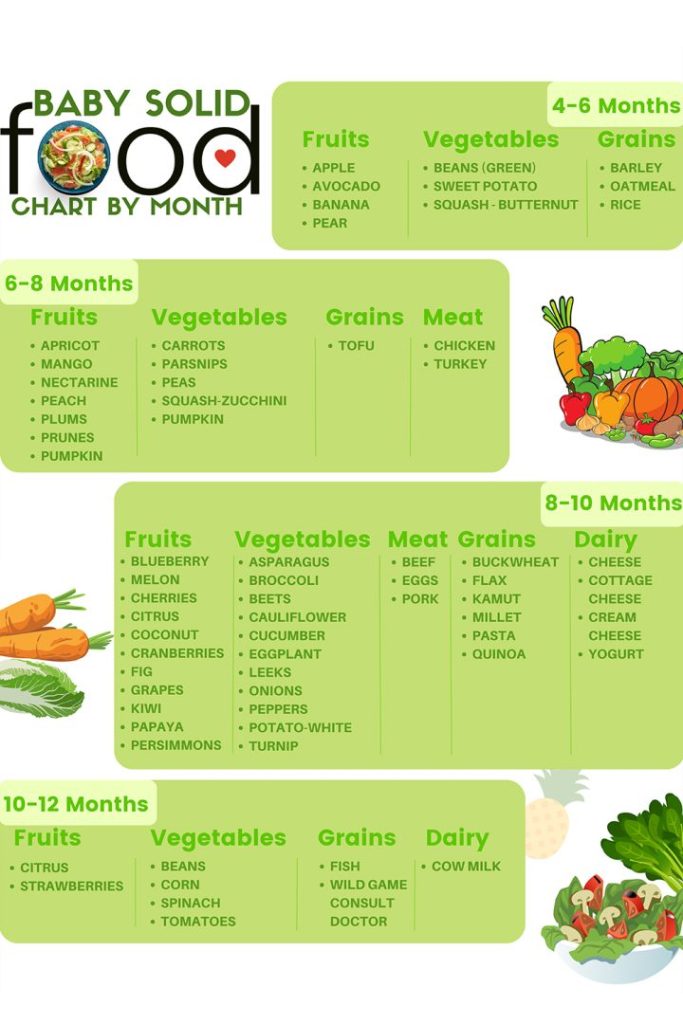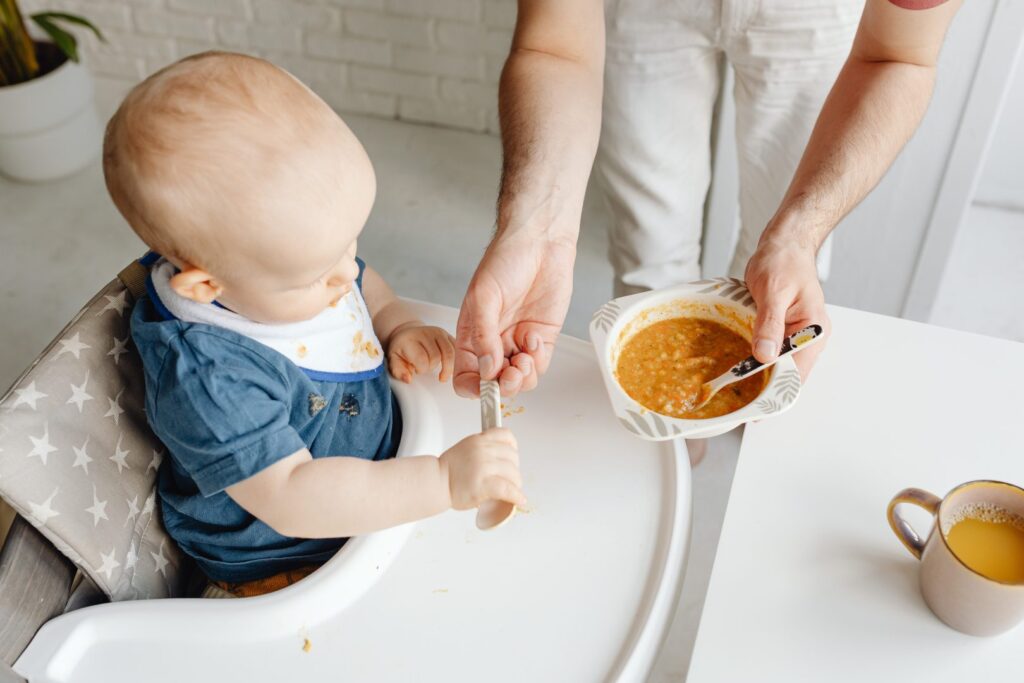Whenever my baby moved from one development stage to another, I got more confused and scared, especially when I had to implement solid food.
You can all agree that putting up with your baby’s milestones is exciting yet demanding. The first full diaper, the first walk, and the first word are unforgettable!
In the first few months, your baby gets used to a feeding routine, including breast or formula milk. But, the storm is nearby despite the calming atmosphere.
After several months of a milk-based diet, your baby has to move on to solid food. And you’re probably afraid to test which solids your baby can eat.
Well, worry no more. In this article, we’ll guide you through your baby’s solid food routine using our baby solid food chart.
What Solid Foods Can Babies Eat by Month?
Giving your baby a plate and spoon for the first time is an exciting journey, though scary at the beginning.

Introducing your little one to solid food will make it more used to chewing and swallowing. And the ultimate point is to teach your little one healthy food habits.
You have probably wondered if an apple should be your baby’s first solid food. Or whether it is right to give meat to an 8-month-old baby?
What if your 10-month-old baby eats cherries, coconut, papaya, pork, yogurt, and cheese? Are strawberries bad for a 12-month-old baby?
Look at our baby solid food chart, and you will find answers to your questions and receive guidelines for implementing solids in your baby’s diet.
Baby Solid Food Chart
Before you analyze our baby’s solid food chart, note that you have to keep your baby’s head up while feeding or put it in a feeding chair.

· 4 to 6 Months
That is a period when your baby is getting used to different types of food and tastes step by step. The baby’s menu should contain:
- Fruits such as apple, avocado, banana, pear;
- Vegetables such as beans, sweet potato, squash-butternut;
- Grains such as barley, oatmeal, and rice;
It is known that babies have low levels of iron, so oats or barley are great for the first months. You can prepare them with breast or formula milk.
Also, prepare pureed food for your baby and make a habit of giving your baby the same meal for three days straight, to prevent allergies.
· 6 to 8 Months
Continue with the same habit of giving your child pureed food. By the end of 8 months, your baby will have one to two meals a day.

Don’t stop giving your baby milk, but add the following food to your baby’s daily feeding routine:
- Fruits such as apricot, mango, nectarine, peach, plums, prunes, pumpkin;
- Vegetables such as carrots, parsnips, peas, squash-zucchini, pumpkin; Grains such as toffy;
- Meat such as chicken and turkey;
· 8 to 10 Months
Between 8 to 10 months, you can add the following dishes to your baby’s daily routine, making your baby’s menu quite royal:
- Fruits such as cherries, grapes, coconuts, melon, and others on our chart;
- Vegetables such as asparagus, onions, leeks, turnip and others on the chart;
- Meat such as beef, eggs, pork;
- Grains such as pasta, millet, and quinoa;
- Dairy such as cheese, cream cheese, and yogurt;
You can also offer mashed fruit, soft-cooked vegetables, and small pieces of meat. And don’t add salt and sugar to your baby’s meal!

· 10 to 12 Months
When your baby is around one year of age, add the following ingredients to your little one’s plate:
- Fruits like citrus and strawberries;
- Vegetables like beans, corn, spinach and tomatoes;
- Fish or wild game;
- Dairy such as cow milk;
At this period you can slowly remove pureed food and implement true solids in your baby’s feedings. Now the whole family can enjoy dinner together!
What Should Be the First Solid Food for a Baby?
As we can see from our baby solid food chart, pureed fruits, vegetables, and some oats can easily take the crown for a baby’s first solid food.
That includes apples, pears, bananas, avocado, beans, sweet potato, barely, oatmeal, or even rice. You can also contact your pediatrician to discuss your baby’s menu.
What is the 3-Day Rule for Baby Solids?
The 3-day rule is a rule recommended by the American Academy of Pediatrics which suggests giving your baby the same meal for three days straight.
That can help you fish out any allergies in your child. Signs of allergic reactions include rashes, diarrhea, or vomiting.

If you have a family allergy history, it’s recommended to introduce your baby to allergy food early, reducing the risk of developing food allergies.
How Many Solid Meals Should Babies Eat?
The amount of solid food that babies should eat depends on their age. When starting out with solids (from 4-6 months) it is best to give your baby a few teaspoons of solids daily. However, it is important to keep track of the ingredients in order to prevent any allergic reactions.
The best way is to start with one ingredient and give your baby a few teaspoons per day, for three days. If the young one doesn’t have any reaction, you can introduce another ingredient to their diet.
When your baby is from 8-10 months, you can start increasing their daily solid intake to two solid meals per day.
When your baby reaches 10-11 months, it can have three solid meals. Lastly, a one-year-old baby can have three healthy and solid meals, and you can even add snacks.
However, all of these measurements depend on the baby and there isn’t a universal chart. It is best to consult with your pediatrician before creating your baby’s solid meal diet plan.
Additionally, it is important to know that milk (breast milk or formula) is their main diet until at least 1 year old, and despite giving solids, your baby should also drink milk. Check out our baby formula feeding chart to learn more about the amount per day depending on their age.
When do Babies Start Eating Baby Food in Jars?
Have you ever felt the urge to just give your baby a jar of food and let it nibble on it? I sure have.
Well, you can’t do that right away. Experts claim that babies can’t eat food in jars until about four months of age. So, until then, you’ll have to nurture your little pumpkin with formula milk or breastfeed them.

Is it OK to Give my Baby Solids at 4 Months?
Introducing your baby to solid food can truly relieve you from worrying about formulas or breastfeeding.
But you can’t give your baby solids whenever you feel like it. There are guidelines because babies are specific regarding solids.
So, medical experts advise you should wait until the age of about six months before giving your baby solid foods.
What Age do Babies Eat Cereal
Whether it’s Frosted Flakes, Cheerios, Fruit Loops, or Lucky Charms, every child loves to crunch some cereal!
So, an ideal time to implement cereal in your baby’s diet is when it’s around six to seven months old.
My babies loved eating cereal, and there are some great baby cereals (such as Gerber) that provide enough nutritional value.
ALSO READ: How to Identify Toxic Adult Children and Fix The Situation







